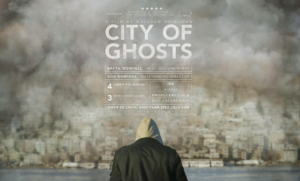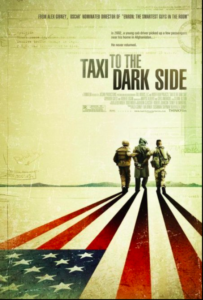Peak Documentary Has Arrived in TV Too
Peak TV, as FX CEO John Landgraf frequently mentions, is indeed sending hundreds of scripted TV shows washing over the audiences for traditional and over-the-top television. Less noticed, however, is that we may be in the middle of Peak Documentary too. As many as 30 channels are producing at least some documentary content, said Molly Thompson, founder of A&E Films and executive producer of feature documentaries such as "City of Ghosts" and "Studio 54." Thompson moderated a high-profile panel on the state of documentaries this week for the Hollywood Radio & Television Society.And more outlets are coming. Both Disney and Apple are building slates of online video content that include non-fiction material, and even Facebook's Watch section is home to a variety of lower-end unscripted and documentary content.Peak Documentary is about more than just an explosion of distribution outlets, however. Public interest has been fueled by better storytelling and a new generation of creators, panelists said."I think documentary filmmakers upped their games: Steve James and Barbara Kopple and Errol Morris," said Oscar and Emmy winner Alex Gibney ("Taxi to the Dark Side," "Going Clear"), who has himself been one of the key figures in the rise of documentaries."Suddenly, there was a new storytelling impetus," Gibney said. "We said, 'We can tell stories like fiction,' but there’s something more unpredictable (because they're true). That made documentaries more interesting to watch than many fiction films that had become rather formulaic."Some of the change came with the TV outlets themselves. HBO had long been home to quality documentaries, and Netflix CEO Reed Hastings has championed the form since the late 1990s.But when basic cable kingpin ESPN developed the "30 for 30" format, "it was really interesting," Gibney said. "They branded around it, but each doc has the voice of the director. (They basically said) 'We bring people in to do their thing, not to do our thing,' That's one of the most exciting things about the way the landscape has changed."Just as important as the number of outlets carrying documentary content is a focus on "premium" material, Thompson said. Premium content in general has become a standard strategy as networks try to differentiate themselves in an industry evolving from cable bundles toward the standalone free-for-all of an OTT-dominated world.Documentary filmmakers likely also have benefited, at least indirectly, in the disinvestment in hard news by broadcast networks, which are focused on the more profitable, lightweight content of their morning shows, said Vinnie Maholtra, Showtime's head of documentaries and previously part of "30 for 30."
As many as 30 channels are producing at least some documentary content, said Molly Thompson, founder of A&E Films and executive producer of feature documentaries such as "City of Ghosts" and "Studio 54." Thompson moderated a high-profile panel on the state of documentaries this week for the Hollywood Radio & Television Society.And more outlets are coming. Both Disney and Apple are building slates of online video content that include non-fiction material, and even Facebook's Watch section is home to a variety of lower-end unscripted and documentary content.Peak Documentary is about more than just an explosion of distribution outlets, however. Public interest has been fueled by better storytelling and a new generation of creators, panelists said."I think documentary filmmakers upped their games: Steve James and Barbara Kopple and Errol Morris," said Oscar and Emmy winner Alex Gibney ("Taxi to the Dark Side," "Going Clear"), who has himself been one of the key figures in the rise of documentaries."Suddenly, there was a new storytelling impetus," Gibney said. "We said, 'We can tell stories like fiction,' but there’s something more unpredictable (because they're true). That made documentaries more interesting to watch than many fiction films that had become rather formulaic."Some of the change came with the TV outlets themselves. HBO had long been home to quality documentaries, and Netflix CEO Reed Hastings has championed the form since the late 1990s.But when basic cable kingpin ESPN developed the "30 for 30" format, "it was really interesting," Gibney said. "They branded around it, but each doc has the voice of the director. (They basically said) 'We bring people in to do their thing, not to do our thing,' That's one of the most exciting things about the way the landscape has changed."Just as important as the number of outlets carrying documentary content is a focus on "premium" material, Thompson said. Premium content in general has become a standard strategy as networks try to differentiate themselves in an industry evolving from cable bundles toward the standalone free-for-all of an OTT-dominated world.Documentary filmmakers likely also have benefited, at least indirectly, in the disinvestment in hard news by broadcast networks, which are focused on the more profitable, lightweight content of their morning shows, said Vinnie Maholtra, Showtime's head of documentaries and previously part of "30 for 30." "Coming out of the coverage of the Iraq War, there was frustration that there was no real coverage of the war's effects" on network news, said Maholtra, an ABC News veteran. That absence of attention has been significantly redressed by projects such as "The Pat Tillman Story," "Restrepo," To Hell and Back Again," and other docs that looked at the war from many perspectives: on the ground, on the home front, in politics and more.Dawn Porter, who formerly oversaw standards and practices as a lawyer for ABC News before coming to A&E Networks, and then moving to becoming a documentary maker herself."I saw the decline in investment in hard news," Porter said. The shift in audience interest was really "a confluence of events: the rise in reality TV, disinvestment in hard news and the rise of documentaries. One of the reasons people are voraciously consuming what we make is because they believe it."Now, the business has taken off in many directions, but for filmmakers, the keys include finding the right place for a project, and making sure that place is going to protect a filmmaker during the vulnerable and time-consuming process of gathering information and putting a project together, said Liesl Copland, a partner at WME with a self-avowed passion for documentaries that has flowered into a full-fledged business for the talent agency."The authenticity meter and the sophistication of (audiences in realizing) who is behind it, is it a brand, a bot, a Russian troll," said Copland. "That kind of doubles the effect on the true form. The storytellers have more power."Even short documentaries are getting more and more love. This year's ShortsTV theatrical release of all the Oscar-nominated short films – which includes documentary, animated and live-action work – beat its best-ever year at the box office by 25 percent, selling $3.5 million worth of tickets in less than two months in release.At the same time, as documentaries stack up new audiences, make money and exert influence, they're suddenly being seen as a threat by fiction-facing filmmakers."Something peculiar is happening in the marketplace that I never would have anticipated," said Gibney, who now employs about 100 people simultaneously working on docs for "many networks.""If you're going after a story and the big studio is also going for the life rights on the story, I would say I'm just a little documentary," Gibney said. "Now there's a big fight over the doc being produced because there's a perception that one will eclipse the other. It's a staggering thing."Copland said the scripted and doc versions of a story don't have be seen as competing, however."There's the Ryan Murphy series about the O.J. Simpson trial and the incredible Ezra Edelman documentary," Copland said as one example. "It's not a zero-sum game."
"Coming out of the coverage of the Iraq War, there was frustration that there was no real coverage of the war's effects" on network news, said Maholtra, an ABC News veteran. That absence of attention has been significantly redressed by projects such as "The Pat Tillman Story," "Restrepo," To Hell and Back Again," and other docs that looked at the war from many perspectives: on the ground, on the home front, in politics and more.Dawn Porter, who formerly oversaw standards and practices as a lawyer for ABC News before coming to A&E Networks, and then moving to becoming a documentary maker herself."I saw the decline in investment in hard news," Porter said. The shift in audience interest was really "a confluence of events: the rise in reality TV, disinvestment in hard news and the rise of documentaries. One of the reasons people are voraciously consuming what we make is because they believe it."Now, the business has taken off in many directions, but for filmmakers, the keys include finding the right place for a project, and making sure that place is going to protect a filmmaker during the vulnerable and time-consuming process of gathering information and putting a project together, said Liesl Copland, a partner at WME with a self-avowed passion for documentaries that has flowered into a full-fledged business for the talent agency."The authenticity meter and the sophistication of (audiences in realizing) who is behind it, is it a brand, a bot, a Russian troll," said Copland. "That kind of doubles the effect on the true form. The storytellers have more power."Even short documentaries are getting more and more love. This year's ShortsTV theatrical release of all the Oscar-nominated short films – which includes documentary, animated and live-action work – beat its best-ever year at the box office by 25 percent, selling $3.5 million worth of tickets in less than two months in release.At the same time, as documentaries stack up new audiences, make money and exert influence, they're suddenly being seen as a threat by fiction-facing filmmakers."Something peculiar is happening in the marketplace that I never would have anticipated," said Gibney, who now employs about 100 people simultaneously working on docs for "many networks.""If you're going after a story and the big studio is also going for the life rights on the story, I would say I'm just a little documentary," Gibney said. "Now there's a big fight over the doc being produced because there's a perception that one will eclipse the other. It's a staggering thing."Copland said the scripted and doc versions of a story don't have be seen as competing, however."There's the Ryan Murphy series about the O.J. Simpson trial and the incredible Ezra Edelman documentary," Copland said as one example. "It's not a zero-sum game."